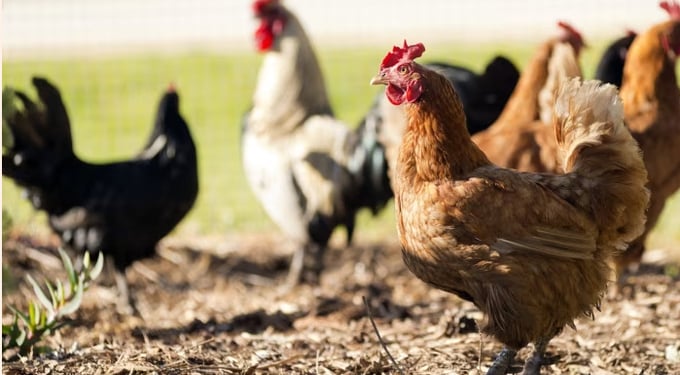December 16, 2025 | 02:35 GMT +7
December 16, 2025 | 02:35 GMT +7
Hotline: 0913.378.918
December 16, 2025 | 02:35 GMT +7
Hotline: 0913.378.918

The EU is set to levy tariffs on poultry, as well as eggs, sugar, oats and other foodstuffs, if quantities exceed the annual mean average imported between July 2021 and December 2023.
EU member states have agreed to tighten restrictions on imports of important Ukrainian foodstuffs to pacify angry farmers who claim goods from the war-torn country are undermining prices.
While cuts have infuriated supporters of Kyiv who want to bolster its fight against Russia, the proposed measures fall short of what Poland and France had originally demanded as the price for extending tariff-free access for most products.
Wheat will crucially be exempt from the curbs after Italy extracted a pledge from the European Commission where it committed to intervene if prices dropped too far, including by buying surplus Ukrainian cereals using public money.
But the bloc is set to levy tariffs on poultry, eggs, sugar, oats, maize, honey and groats (grain kernels) if quantities exceed the annual mean average imported between July 2021 and December last year.
The move will cost Ukraine about €330mn in annual revenue if it cannot find alternative markets, up from about €240mn under an original commission proposal, according to EU diplomats.
Belgium brokered a compromise after France, Poland and Hungary pushed for bigger import restrictions that were resisted by a group including Germany, the Netherlands, Sweden and Portugal.
“We made it very clear that we simply cannot stab Ukraine in the back like that, and must stick to our promise to support Ukraine as intensely as we can on trade,” said one diplomat, speaking on condition of anonymity.
“However, the countries around Poland and France continue to be driven by their domestic farmers.” Ukraine’s agriculture minister Mykola Solskyi told the Financial Times this week that the revenue loss would extend the war as Kyiv needed money to pay for weapons, soldiers and other needs.
To try to win over governments in countries bordering Ukraine, the commission also proposed to levy tariffs on Russian and Belarusian grain.
EU cereal prices are at a four-year low. The surge in imports has exacerbated protests by farmers about greater costs and regulation. Poland, Hungary and Slovakia maintain unilateral bans introduced last year in violation of EU trade rules.
They only allow many products to enter if they are being transited to other countries. The EU deal may not be enough to appease Polish farmers, who have blockaded important border crossings to demand an end to cheap Ukrainian agriculture imports. Polish Prime Minister Donald Tusk and his Ukrainian counterpart Denys Shmyhal meet in Warsaw on Thursday.
However, on Wednesday Poland’s agriculture minister Czesław Siekierski downplayed expectations that the farm dispute could now be fully resolved after what he called “very difficult talks” that had already taken place with Ukrainian officials.
He told a news conference that Poland could not accept that farmers, mainly in border countries, get burdened with costs that are too high in terms of trade liberalisation.” Siekierski added: “We in the agriculture ministry are talking about the need to separate humanitarian aid, military aid or economic support as a whole” from farming issues.
Ahead of local elections in April, the farming protests have become a problem for Tusk, who has struggled to meet his pledge to restore good relations with Ukraine, which became strained in the final year of the previous government.
Tusk maintained the import ban after taking office in December, while also promising to defend other Polish economic interests, including those of truckers who blockaded border crossings late last year to complain about cheaper Ukrainian drivers taking away their EU transport business.
The curbs agreed in Brussels are due to start on June 6, when tariff-free access for Ukrainian imports is renewed for a further year. The deal will require final approval by the European parliament in April.
(FT)

(VAN) The event calls for urgent action to preserve glaciers, and recognises Mountain Future Award-winning projects in Colombia, Kyrgyzstan and Pakistan that protect mountain ecosystems and build resilience.

(VAN) New evidence shows that the health impacts of the Industrial Revolution varied more widely than previously believed, challenging the longstanding narrative that rural communities remained comparatively untouched.

(VAN) FAS forecasts a 2.2% rise in corn imports for MY 2025-26, reaching 15.8 million tonnes, the highest volume in six years.

(VAN) Donald Trump said he is considering 'very severe' tariffs on imports of fertilizer from Canada, as the U.S. prepares a multibillion-dollar funding package for its own farmers.

(VAN) Initiative launched in Cairo honors villages that are helping drive agrifood systems transformation.

(VAN) The European Union agreed Wednesday to phase out Russian natural gas imports by late 2027 as part of an effort to end the bloc’s decade-long dependency on Russian energy.

(VAN) Indonesia plans a US$1.2 billion investment in feed mills to boost poultry feed production.